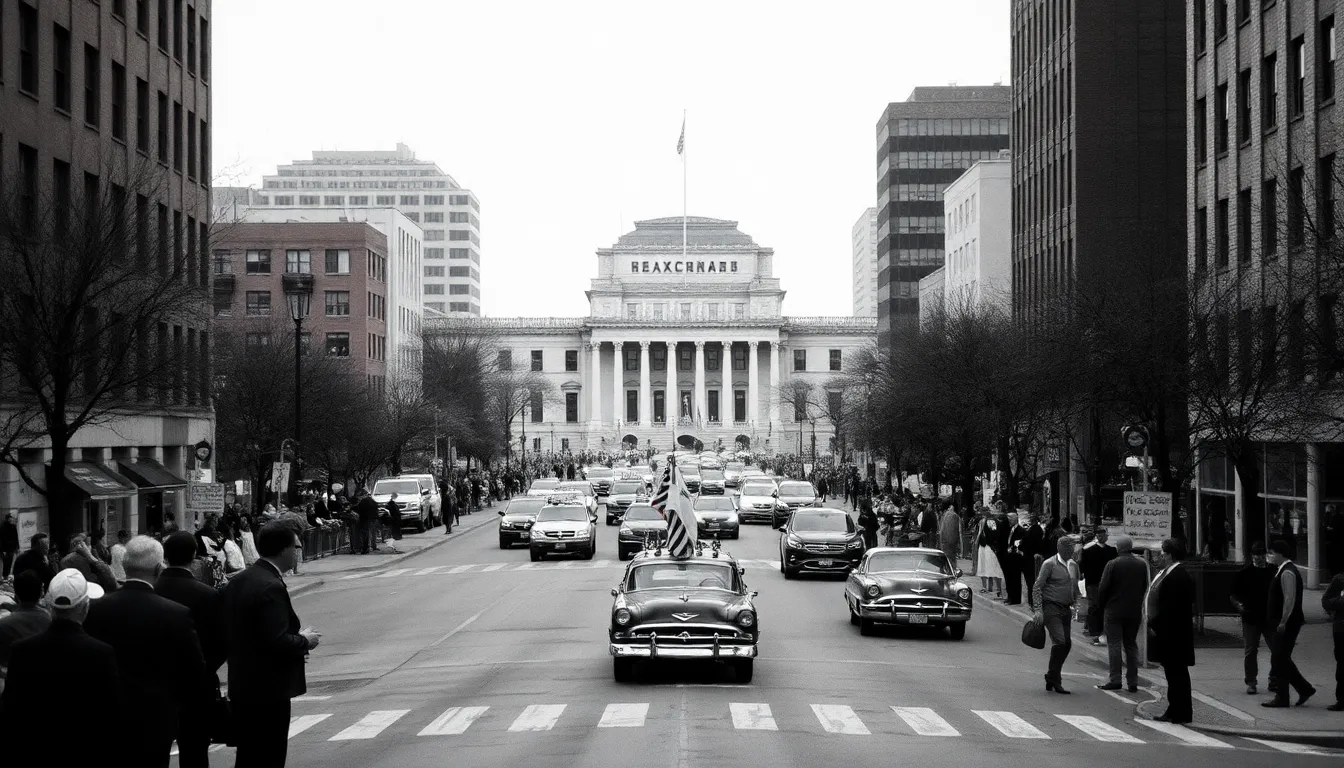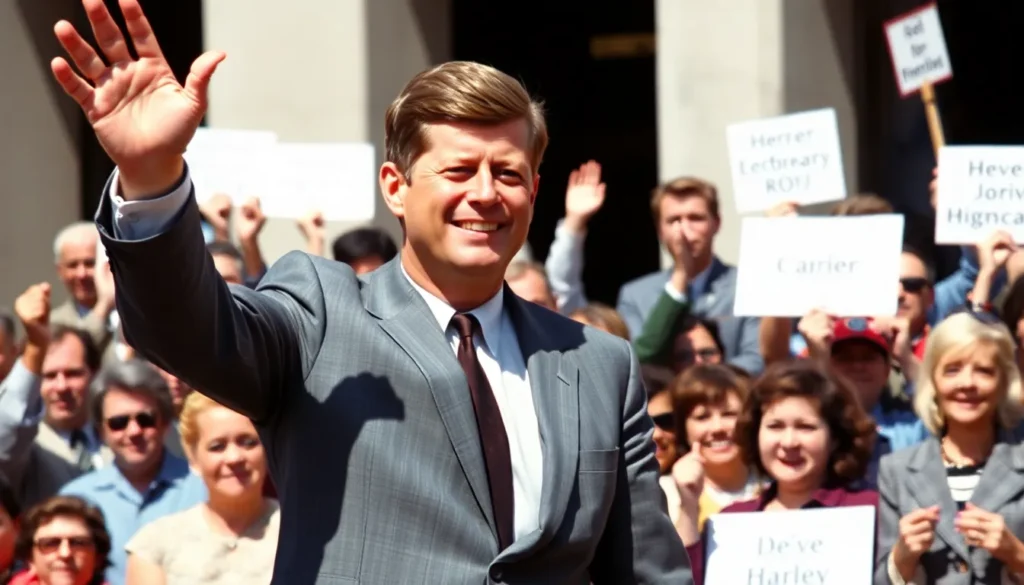On a sunny day in November 1963, history took a shocking turn that no one saw coming. President John F. Kennedy was assassinated, leaving a nation in disbelief and sparking countless conspiracy theories that still keep armchair detectives busy. If you think your Monday morning drama is intense, just wait until you dive into the events of that fateful day.
But why does this moment still matter? It’s not just a date in a history book; it’s a pivotal point that shaped American politics and culture. So grab your favorite snack and settle in, because understanding the year Kennedy was assassinated is more than just trivia—it’s a glimpse into a turbulent era that continues to echo through time.
Table of Contents
ToggleOverview of JFK’s Presidency
John F. Kennedy served as the 35th president of the United States from January 20, 1961, to November 22, 1963. His leadership came during a transformative period marked by significant political and social change. The Cuban Missile Crisis exemplified Kennedy’s ability to navigate high-stakes diplomacy. In that critical moment of October 1962, he successfully deterred nuclear conflict with the Soviet Union.
Kennedy’s vision of progress included his slogan, “a new frontier.” That mantra guided his domestic policies, which aimed to address economic inequality and promote civil rights. Initiatives like the Peace Corps reflected his commitment to global engagement and humanitarian efforts.
Space exploration also marked Kennedy’s presidency. The ambition to land a man on the moon by the end of the 1960s emerged from his support for NASA and federal funding. This goal not only spurred technological advancement but also united the nation in a shared mission.
Kennedy faced numerous challenges during his tenure. Opposition from conservatives arose over his social programs, while the civil rights movement began to gain momentum. He responded by advocating for civil rights legislation, which paved the way for future reforms.
Tragedy struck on November 22, 1963, when Kennedy was assassinated in Dallas, Texas. His death shocked the country and led to widespread grief. The repercussions of his presidency continue to influence American politics, culture, and civic engagement, making it a pivotal period in U.S. history.
The Assassination Event

The assassination of President John F. Kennedy occurred on November 22, 1963, a day etched into American memory. At approximately 12:30 PM Central Standard Time, he suffered fatal gunshot wounds while riding in a motorcade through Dallas, Texas.
Date and Time
The date of Kennedy’s assassination marked a significant moment in history. Events unfolded rapidly that day, with the first shots fired around 12:30 PM. The world outside seemed unaware of the impending tragedy. Immediate reactions came from bystanders and officials, leading to chaos and confusion in the streets of Dallas. This dark chapter in U.S. history forever altered the nation’s trajectory. Following the assassination, the date became synonymous with a loss of innocence in American politics.
Location
Dallas served as the backdrop for this tragic occurrence. The motorcade traveled through Dealey Plaza, a well-known public space in the city. Surrounding buildings, including the Texas School Book Depository, became infamously tied to the event. The location allowed for a broad public display, and thousands lined the streets to catch a glimpse of the president. Witnesses reported the sights and sounds of the unfolding event, embedding the scenery into the collective memory. Consequently, Dealey Plaza remains a site of reflection, capturing the essence of that fateful day.
Investigations and Findings
Numerous investigations followed the assassination of John F. Kennedy, revealing significant findings and ongoing debates regarding the event’s circumstances.
Warren Commission
The Warren Commission formed to investigate Kennedy’s assassination, officially titled the President’s Commission on the Assassination of Kennedy. Established by President Lyndon B. Johnson, the commission released its report in September 1964. It concluded that Lee Harvey Oswald acted alone in killing Kennedy. The report also stated that there was no credible evidence to support widespread conspiracy claims. Despite its findings, many historians and citizens questioned the commission’s conclusions, prompting continued discussion about the event and its aftermath.
Other Investigative Bodies
Several other investigative bodies examined the assassination, contributing to the debate surrounding the event. The House Select Committee on Assassinations conducted a re-investigation in the late 1970s. This committee suggested that Kennedy was likely the victim of a conspiracy. Reports from various agencies, like the FBI and CIA, also surfaced, revealing inconsistencies in their initial findings. Public interest in these investigations remained high, as researchers and conspiracy theorists searched for unclear details and alternative narratives regarding Kennedy’s death.
The Impact of the Assassination
The assassination of President John F. Kennedy sparked immediate and profound reactions across the nation. People gathered in shock, unable to comprehend the loss of their leader. Numerous cities held vigils and memorials, highlighting the emotional toll on American society. Media coverage dominated airwaves, connecting citizens through shared grief. Political leaders expressed condolences, while public discourse abruptly shifted toward national unity. Kennedy’s death altered the political climate, emphasizing pressing issues like civil rights and public safety in subsequent years.
National Reaction
Responses from the American populace reflected a deep sense of betrayal and devastation. Many citizens took to streets, expressing sorrow and anger. Spontaneous memorials sprang up in towns and cities, illustrating a collective outpouring of grief. Schools and businesses closed to honor the fallen president, showcasing the gravity of the moment. Additionally, discussions about national security and civic responsibility gained momentum, shaping political priorities for years to come.
Global Impact
Killing Kennedy reverberated beyond U.S. borders, altering international perceptions of American leadership. Allies expressed solidarity, while adversaries viewed the event as an opportunity for political maneuvering. Global leaders sent condolences, recognizing the significance of his presidency on world affairs. Concerns about stability in the Cold War context heightened, leading to extra scrutiny on U.S. foreign policies. The resultant uncertainty rippled through various nations, impacting diplomatic relations and shaping international narratives about American democracy.
Legacy of John F. Kennedy
John F. Kennedy’s legacy endures through various social and political advancements. His presidency marked a turning point in civil rights, igniting movements that sought equality and justice. Major legislation followed his initiatives, including the Civil Rights Act of 1964, which has influenced American society significantly.
In terms of foreign policy, Kennedy’s handling of the Cuban Missile Crisis demonstrated a commitment to diplomacy and conflict resolution. His approach reduced the threat of nuclear war and set a precedent for future presidential decision-making during crises. The vision of a “New Frontier” he presented inspired generations to embrace innovation and progress.
Educational initiatives like the Peace Corps highlighted his dedication to global engagement. Through this program, Americans were encouraged to contribute to development efforts worldwide. This spirit of service remains a hallmark of Kennedy’s impact on American culture.
Technological advancements during his tenure also reflected his forward-thinking mentality. Kennedy’s support for NASA and the Apollo program united the nation behind the objective of landing a man on the moon. The successful moon landing in 1969 fulfilled his promise to advance space exploration.
Citizens still remember the profound grief following his assassination, which catalyzed national introspection. Public response illustrated a shared sense of loss and sorrow, spawning lasting tributes. Over time, commemorations continue to honor his contributions to American society.
Analyses of JFK’s presidency further reveal complexities in his policies, showcasing both achievements and challenges. Investigations into his assassination foster debates about the implications for future leaders. Scholarly discourse reflects ongoing interest in his life, career, and enduring influence on American history.
The assassination of John F. Kennedy on November 22, 1963, remains a watershed moment in American history. Its effects continue to reverberate through political discourse and cultural narratives. The tragic loss of a leader who embodied hope and change prompted a national reckoning that reshaped the United States.
As the nation grappled with grief and uncertainty, Kennedy’s legacy emerged as a symbol of progress and aspiration. The questions surrounding his death have fueled ongoing investigations and debates, illustrating the complexities of historical interpretation. This pivotal event not only marked the end of an era but also set the stage for future movements that sought justice, equality, and unity in a rapidly changing world.





